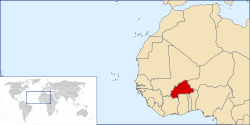Republic of Upper Volta
|
|||||||||||||||||||||||||||||||||||||||||||||||||||||
The Republic of Upper Volta (French: République de Haute-Volta) was established on December 11, 1958, as a self-governing colony within the French Community. Before attaining autonomy it had been French Upper Volta and part of the French Union. On August 5, 1960 it attained full independence from France.
Thomas Sankara came to power through a military coup d'état on August 4, 1983. After the coup, he formed the National Council for the Revolution (CNR), with himself as president. Under the direction of Sankara the name of the state was changed on August 4, 1984, from Upper Volta to Burkina Faso, meaning "the country of honorable people."
The name Upper Volta indicated that the country contains the upper part of the Volta River. The river is divided into three parts, called the Black Volta, White Volta and Red Volta, and the colors of the national flag corresponded to the parts of the river.
In popular culture
West German chancellor Helmut Schmidt liked to describe the Soviet Union of the 1980s as "Upper Volta with missiles", according to David Halberstam in an article published in an August 2007 Vanity Fair magazine. The phrase "Upper Volta with rockets" was also used to describe the Soviet Union (in quotes, but with no attribution) in a survey on the Soviet economy in The Economist on April 9, 1988. According to Perry Anderson, the phrase was popular among foreign diplomats in the 1970s. He suggests the modern Russia might be "Saudi Arabia with rockets".[1]
See also
- History of Burkina Faso
- List of governors of Upper Volta
- List of heads of state of Burkina Faso
- List of heads of government of Burkina Faso
References
- ↑ Anderson, Perry. London Review of Books, Vol 29, No.2, 25 January 2007
|
|||||||||||||||||||||||


